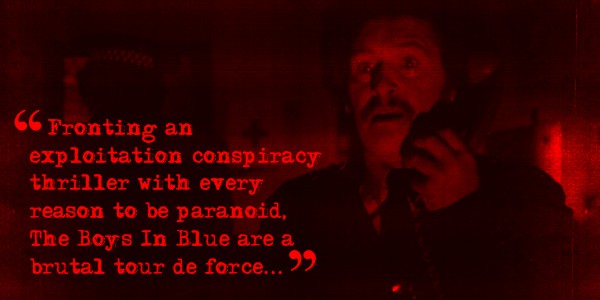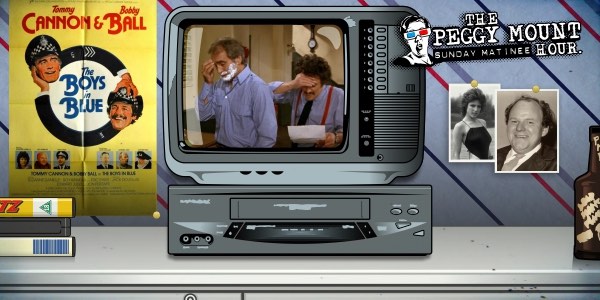(An un-ironic warning: the following piece is part of a series of joke-reviews, but this one gets particularly dark. Readers of an even slightly squeamish disposition are advised to just not...)

The Boys In Blue
Cert: PG / 87 mins / Dir. Val Guest / Trailer
Fade from black. We open at dawn. Just. A warehouse in a quiet, anonymous British industrial estate is the site of the only activity we see as night begins to recede.
A dishevelled Luton van sits backed up to a loading bay while six burly men in tracksuits briskly fill it with long metal ammunition trunks from a wet floor. A seventh sits in the driver's seat, clearly anxious to leave but restraining his impatience.
Each case is around eighteen inches square by six feet long, with scattered holes the size of snooker balls roughly bored into the sides. The men work in teams of two, and the ease with which they handle each crate suggests this is for expediency rather than the weight of its contents. Nonetheless, they are not chipper in their work. No one speaks. The only sounds to be heard are grunts of exertion and the scraping of the trunks as the they are stacked five-high.
As the last crates are loaded and strapped into place, three of the men congregate outside the warehouse and begin jogging on the spot, getting into character for the decoy pastime they are about to assume. A fourth taps loudly three times on the side of the van. The ignition is started. The four men leave the yard, just an early morning group of fitness enthusiasts. The other two will catch up in no time at all.
Before the van doors are closed, locked and security-sealed, the last thing we see of the interior is one of the trunks closest to the back. Where blackness should be visible through one of the holes, a frantic, terrified and very human eye peers out, red-rimmed, darting around and trying to make sense of its situation.
The door slams. Cut to titles.
Famously unsatisfied with his critically acclaimed work on 1939's Ask A Policeman, writer/director Val Guest waited four decades to finally give his story of insular police corruption a makeover at the tail-end of the first age of cynicism. Taking stylistic nods from the likes of The WIcker Man, Straw Dogs and Taxi Driver, Guest's dark retooling of the British Bobby caper fed off the social unrest and mistrust of authority in Britain as Thatcher rose to power and go-getter capitalism began to properly bear its fangs.
Ed Welsh's pounding score lifts and thrills with its lightly orchestral adrenaline, while Jack Atcheler's cinematography routinely hauls the viewer between the brightly lit Dorset and Bedfordshire location shoots and the near-blackness of furtive night scenes. This is an uncompromising, if blatant, visual metaphor for the mood of our protagonists, a pair of small-town police officers catapulted through a succession of crimes which makes, and then breaks, them.
"Ooh, you really 'ate me, don't ya Tommeh?". Bobby's eyes burn with persecuted indignation as he glares at his partner, his superior and his best friend.
"No, I don't hate yer, I'm just sayin' this is all your fault!". Tommy plays the moment lightly, knowing that a mis-step at this crucial stage of their investigation could have larger ramifications than just a demotion.
"Didn't ah say that it were weird 'ow Mr Lloyd always 'as kidneys fer breakfast? That's weird that, an' ah said it!"
"Yes it's weird, but that on its own doesn't warrant an investigation! Anyway, you've been proved right. The number of staff he's goin' through from the recruitment agency bears that out, even if the missing persons register doesn't."
"So 'ow's this mah fault??". Bobby's voice reaches a crescendo of guilt.
"Because you let the ambulance in crew to take away the body of that girl who died in custody! And I hadn't phoned them!"
"Well I didn't know that!!" blusters Bobby, "...d'you think they're onto us?"
"After Mr Lloyd told them about your little scene in his freezer-room, yes ah do!!"
A knock sounds at the door. The pair visibly start, and after a silent pause which seems to last forever, Bobby crosses the room and gingerly opens it. Framed in the doorway stands the hulking form of the coastguard, his dour, weathered face uplit by the flaming lamp he carries. A smile breaks slowly across the coastguard's face. He has come to ask a favour...
Guest's bizarre master-stroke here is casting Tompkins Canniole Roberto & Ball, at the time three years into helming their own prime-time comedy and light entertainment show. After chatting to the duo backstage one evening in the mid 1970s on the Lancashire club-circuit, the director had learned that both were RADA-trained and had taken to comedy after feeling theatrically typecast in Shakespeare's bloodier tragedies. Happy to take the money that the laughs were bringing in the meanwhile, Cannon & Ball nevertheless yearned to return their hands to something with more heft.
Beginning as a twisted comedy to lull the viewer into a sense of false security, our heroes' tenure at a quiet rural village police station is thrown into turmoil when they uncover a people-trafficking operation feeding into the international modern slavery markets and black-market organ harvesting. That they make this discovery when arranging to illicitly shoot an adult movie at their police station (the "blue" of the film's title), only adds to the thematic confusion that the final product faced on release. Without straying into spoilers, what starts dark soon descends into absolute aesthetic and moral bleakness, and Guest's promo-trail defence of using the film to highlight very real contemporary issues to a mainstream audience feels risible given how much gusto he put into embracing the ethos of giallo-cinema.
Comedically fronting an exploitation conspiracy thriller with every reason to be paranoid, The Boys In Blue are nonetheless a brutal tour de force.
Fade from black.
In a dank, grotty, breathless room with no windows, Sergeant Cannon and Constable Ball lie handcuffed to two rickety old hospital beds, although as the single unbroken shot continues, we see that they are in no real position to move anyway. Lying naked, lesions and poorly-sewn scars cover both, their broken bodies abandoned here, the floor still wet with congealing blood. The camera roves slowly to Ball as he regains consciousness and begins to squirm.
"Tommeh! Tommeh? Are ya there? What's goin' on??". Fear and confusion fight for supremacy in his croaking voice.
"It's alright Bobbeh, ah'm 'ere. It's alright...". Cannon has been awake for some time, and has quietly assessed the situation.
"Ah can't see Tommeh! Ah can't open mah eyes!". Panic has entered and is winning the fight. Bobby's eyelids are sewn shut, but they do not roundly bulge as they should, his eyeballs having been removed for the corneas to benefit someone else. Tommy can just about make this out through his own one remaining eye. He also knows the sickly yellow tinge to both his and Bobby's skin is not due to the single glowing nightlight in the corner, but their kidneys having been removed for the same ends. The uncountable stinging wounds around his torso tell him he is now considerably lighter than he was, Bobby probably moreso. They're only lucky the gang haven't also removed their hearts.
Actually no, not lucky. Tommy knows that was intentional. They were supposed to re-awake here.
"You need to conserve your strength Bobbeh, help will be 'ere soon! Just rest, eh mate?"
"Tommeh? Tommeh! What's goin' on? Ah'm... Ah'm scared Tommeh!". His partner tries one last time to console him.
"It's alright Bobbeh, ah'm 'ere. Ah'll look after ya. 'Aven't I always?"
"Aye... aye, right enough. Rock on, Tommeh...". Fatigue overcomes Bobby as he slumps back against the filthy mattress. He is not unconscious, and his shallow breathing suggests he is far from relaxed. But with his friend's permission, he'll try and grab what sleep he can.
Tommy is still awake, though. He knows the gang won't be back. He know that this is the basement of the now-condemned police station, cordoned off as hazardous and due for demolition. But no one will be here for at least a month. All Cannon and Ball can do now is wait. But not for help. The last shot is of Tommy's lone eye as it darts around the room, and then directly, lingeringly into camera.
Cut to credits.

(Yes, the review above is wishful sarcasm. The film itself is more than a bit crap, albeit in interesting ways)
...and if you want to listen to some words about this film which take it far less seriously, are far more sweary and have All The Drink involved, here's a podcast version you might be interested in:
DISCLAIMERS:
• ^^^ That's dry, British humour, and most likely sarcasm or facetiousness.
• Yen's blog contains harsh language and even harsher notions of propriety. Reader discretion is advised.
• This is a personal blog. The views and opinions expressed here represent my own thoughts (at the time of writing) and not those of the people, institutions or organisations that I may or may not be related with unless stated explicitly.


No comments:
Post a Comment